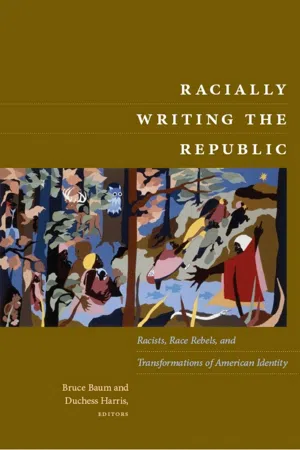
Racially Writing the Republic
Racists, Race Rebels, and Transformations of American Identity
- English
- PDF
- Available on iOS & Android
Racially Writing the Republic
Racists, Race Rebels, and Transformations of American Identity
About This Book
Racially Writing the Republic investigates the central role of race in the construction and transformation of American national identity from the Revolutionary War era to the height of the civil rights movement. Drawing on political theory, American studies, critical race theory, and gender studies, the contributors to this collection highlight the assumptions of white (and often male) supremacy underlying the thought and actions of major U.S. political and social leaders. At the same time, they examine how nonwhite writers and activists have struggled against racism and for the full realization of America's political ideals. The essays are arranged chronologically by subject, and, with one exception, each essay is focused on a single figure, from George Washington to James Baldwin.
The contributors analyze Thomas Jefferson's legacy in light of his sexual relationship with his slave, Sally Hemings; the way that Samuel Gompers, the first president of the American Federation of Labor, rallied his organization against Chinese immigrant workers; and the eugenicist origins of the early-twentieth-century birth-control movement led by Margaret Sanger. They draw attention to the writing of Sarah Winnemucca, a Northern Piute and one of the first published Native American authors; the anti-lynching activist Ida B. Wells-Barnett; the Filipino American writer Carlos Bulosan; and the playwright Lorraine Hansberry, who linked civil rights struggles in the United States to anticolonial efforts abroad. Other figures considered include Alexis de Tocqueville and his traveling companion Gustave de Beaumont, Juan Nepomuceno Cortina (who fought against Anglo American expansion in what is now Texas), Abraham Lincoln, Theodore Roosevelt, and W. E. B. Du Bois. In the afterword, George Lipsitz reflects on U.S. racial politics since 1965.
Contributors. Bruce Baum, Cari M. Carpenter, Gary Gerstle, Duchess Harris, Catherine A. Holland, Allan Punzalan Isaac, Laura Janara, Ben Keppel, George Lipsitz, Gwendolyn Mink, Joel Olson, Dorothy Roberts, Patricia A. Schechter, John Kuo Wei Tchen, Jerry Thompson
Frequently asked questions
Information
Table of contents
- Contents
- Acknowledgments
- Introduction
- George Washington: Porcelain, Tea, and Revolution
- Jefferson’s Legacies: Racial Intimacies and American Identity
- Tocqueville and Beaumont, Brothers and Others
- “The Sacred Right of Self-Preservation”: Juan Nepomuceno Cortina and the Struggle for Justice in Texas
- “Shoot Mr. Lincoln”?
- Sarah Winnemucca and the Rewriting of Nation
- The Politics of the Possible: Ida B. Wells-Barnett’s Crusade for Justice
- Meat vs. Rice (and Pasta): Samuel Gompers and the Republic of White Labor
- Theodore Roosevelt and the Divided Character of American Nationalism
- Margaret Sanger and the Racial Origins of the Birth Control Movement
- W. E. B. Du Bois and the Race Concept
- Displacing Filipinos, Dislocating America: Carlos Bulosan’s America Is in the Heart
- Looking through Sidney Brustein’s Window: Lorraine Hansberry’s New Frontier, 1959–1965
- James Baldwin’s “Discovery of What It Means to Be an American”
- Afterword: Racially Writing the Republic and Racially Righting the Republic
- Bibliography
- Contributors
- Index